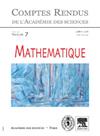关于“带边界条件的随机哈密顿系统的特征值问题”的注记
IF 0.7
4区 数学
Q2 MATHEMATICS
引用次数: 1
摘要
彭\cite{peng}(2000)研究了具有边界条件的随机哈密顿系统的特征值问题。对于一维情况,用$\{\lambda_n\}_{n=1}^{\infty}$表示该特征值问题的所有特征值,Peng证明了$\lambda_n\to +\infty$。在这篇短文中,我们证明了$\lambda_n$的增长顺序与$n^2$和$n\to +\infty$相同。该结果除了本身的有趣之外,还可以通过相应的系数和时间长度直接估计FBSDEs解的统计周期。本文章由计算机程序翻译,如有差异,请以英文原文为准。
A note on “Problem of eigenvalues of stochastic Hamiltonian systems with boundary conditions”
The eigenvalue problem of stochastic Hamiltonian systems with boundary conditions was studied by Peng \cite{peng} in 2000. For one-dimensional case, denoting by $\{\lambda_n\}_{n=1}^{\infty}$ all the eigenvalues of such an eigenvalue problem, Peng proved that $\lambda_n\to +\infty$. In this short note, we prove that the growth order of $\lambda_n$ is the same as $n^2$ as $n\to +\infty$. Apart from the interesting of its own, by this result, the statistic period of solutions of FBSDEs can be estimated directly by corresponding coefficients and time duration.
求助全文
通过发布文献求助,成功后即可免费获取论文全文。
去求助
来源期刊
CiteScore
1.30
自引率
0.00%
发文量
115
审稿时长
16.6 weeks
期刊介绍:
The Comptes Rendus - Mathématique cover all fields of the discipline: Logic, Combinatorics, Number Theory, Group Theory, Mathematical Analysis, (Partial) Differential Equations, Geometry, Topology, Dynamical systems, Mathematical Physics, Mathematical Problems in Mechanics, Signal Theory, Mathematical Economics, …
Articles are original notes that briefly describe an important discovery or result. The articles are written in French or English.
The journal also publishes review papers, thematic issues and texts reflecting the activity of Académie des sciences in the field of Mathematics.

 求助内容:
求助内容: 应助结果提醒方式:
应助结果提醒方式:


